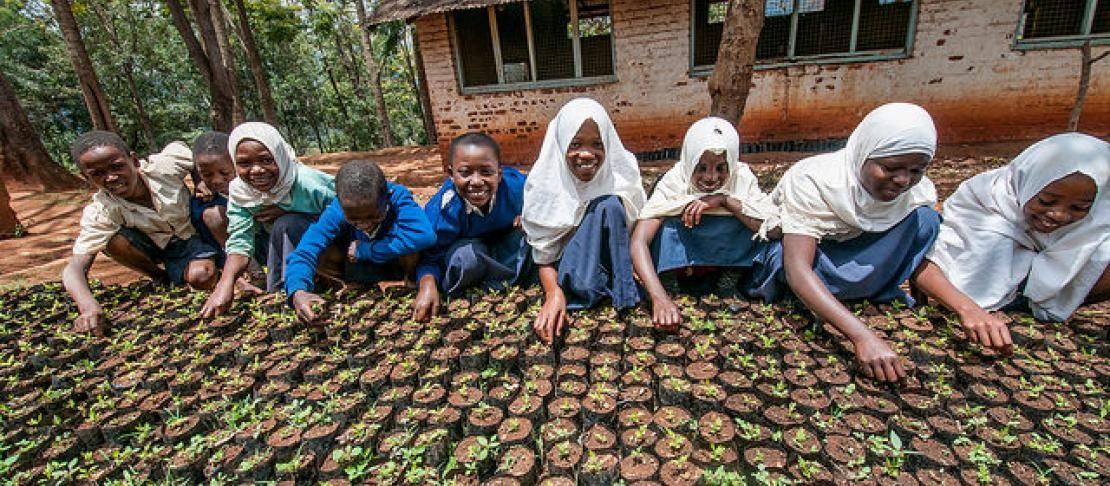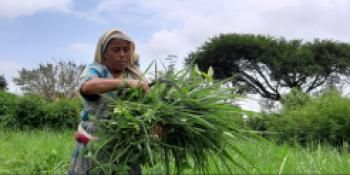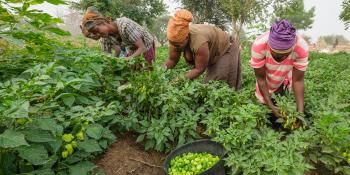Farming the future: the role of youth in agriculture and climate change

Youth are the future of farming: can they lead the way in a changing climate?
The future of farming may very well lie in scientific progress, economic interventions, and binding international agreements, but none of these approaches will succeed without buy-in from those who matter most – the farmers themselves. To be specific, young farmers, who are the future of farming.
This may seem obvious, but on the morning of November 16 in the red desert of Marrakech, Morocco, six thought leaders, advocates, policy experts, researchers, and farmers joined an audience of participants and observers to discuss the potential of young farmers to rejuvenate an aging global agricultural sector and work to achieve a sustainable and equitable global future. The discussion took place alongside the UN Climate Talks, where leaders shape the global climate change policies that will impact future generations.
A key theme of the panel was the power of including farmers in national and international discussions around agricultural policy. Richard Bower, a young beef and cereal farmer and Chairman of the Next Generation Policy Forum of the UK’s National Farmer’s Union, positioned farmers as professionals who, in many ways, already practice climate-smart techniques. However, without creating a platform for knowledge sharing, farmers and stakeholders throughout the entire supply chain are unable to learn from each other.
Panelists looked towards youth as key players in increasing farmer visibility by leveraging rapidly developing technology and working together to produce positioning documents including the Young Farmer’s Manifesto, published in 2015 by the European Council of Young Farmers. Dr. Marco Marzano de Marinis, Secretary General of the World Farmers Organization in Rome, Italy, described the Manifesto as a product of collaboration between young farmers all over the world. In addition to showcasing the perspectives of international youth and potential of their collaboration, the Manifesto is a vital tool for policymakers as they seek to scale new farming techniques with vast adaptation and mitigation potential.
In addition to producers, consumers play a pivotal role in enacting a sea change in how people purchase and consume food. Daniele Perrone of Coldiretti Giovani Impresa, the youth movement of Italy’s National Farmers’ Confederation highlighted that any progress in improved food security and competitiveness, for example, requires a new development model, now more possible thanks to 2015’s Paris Agreement. As consumers grow more interested in the quality, sustainability, and safety of the products they buy, an actionable goal is to promote innovative methods of consumer education educate that improve farmer competitiveness.
So who holds the keys to this innovation and how can it be achieved? According to Anette Friis, Head of Program Coordination at the CGIAR Research Program On Climate Change, Agriculture and Food Security (CCAFS), innovation is already happening, but its ability to achieve noticeable impact is limited by challenges such as climate change. Initiatives like climate-smart villages allow farmers and scientists to work together to test and implement cutting edge approaches for adaptation and mitigation, but reaching farmers are both ends of the spectrum (those that are the richest and the poorest) is challenging, and need to be inclusive of youth in order to be successful.
According to Divine Ntiokam, a Global Youth Digital Advocate for Yaoundé, these challenges are exacerbated by a lack of access to funding. In his experience, networking and digital innovation is largely financed by the farmers themselves. It’s important that people, organization, and governments invest directly in farmers to increase access to capacity training and certification programs.
Michael Hoevel of Farming First, a global coalition for sustainable agricultural development, shared the coalition’ vision to partner with other likeminded organizations to run public campaigns highlighting aforementioned issues and more. A recent campaign #IamAg worked to engage young people in agriculture. He spoke of an ideal where young people viewed pursuing agricultural livelihoods in rural areas as equally as attractive as urban. In order to achieve this, we need to position farmers as indispensable members of feeding urban populations.
Broader discussion opened up to the role of institutions, with a common theme emerging around a need to change the way farmers receive information. Furthermore, farmers need access to better and more informative information, like climate change forecasts. She shared an example where CCAFS and national partners in Senegal are disseminating climate information and advice to farmers, which now reaches over 7 million rural people via SMS and community radio. Extension services are incredibly important but equally as challenging, and they present ample space for improvement.
The conversation concluded with a unanimous agreement that young people are ready and eager to take advantage of new technologies, but global organizations like those in attendance play a significant role in helping clear the path. In the words of Divine Ntiokam, “climate change is an opportunity, and young people need more access to resources in order to meet these opportunities.”
Elizabeth Minchew is a student at the Fletcher School of Law and Diplomacy, Tufts University. Click to read more coverage of CCAFS events at COP22.



